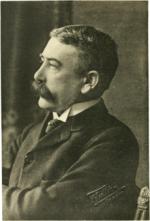Disable ads!
Ferdinand de Saussure
Semiotics General concepts Sign (relation relational complex) Code Confabulation Connotation / Denotation Encoding / Decoding Lexical Modality Representation Salience Semiosis Semiosphere Semiotic elements and sign classes Umwelt Value Fields Biosemiotics Cognitive semiotics Computational semiotics Literary semiotics Semiotics of culture Methods Commutation test Paradigmatic analysis Syntagmatic analysis Semioticians Mikhail Bakhtin Roland Barthes Marcel Danesi John Deely Umberto Eco Algirdas Julien Greimas Félix Guattari Louis Hjelmslev Vyacheslav Ivanov Roman Jakobson Roberta Kevelson Kalevi Kull Juri Lotman Charles S. Peirce Augusto Ponzio Ferdinand de Saussure Thomas Sebeok Michael Silverstein Eero Tarasti Vladimir Toporov Jakob von Uexküll Related topics Copenhagen–Tartu school Tartu–Moscow Semiotic School Post-structuralism Structuralism Postmodernity v t e Ferdinand de Saussure (/sɔːˈsʊr/ or /soʊˈsʊr/; French: [fɛʁdinɑ də sosyʁ]; 26 November 1857 – 22 February 1913) was a Swiss linguist and semiotician whose ideas laid a foundation for many significant developments both in linguistics and semiology in the 20th century. He is widely considered one of the fathers of 20th-century linguistics and one of two major fathers (together with Charles Sanders Peirce) of semiotics/semiology. One of his translators, Roy Harris, summarized Saussure's contribution to linguistics and the study of language in the following way: Language is no longer regarded as peripheral to our grasp of the world we live in, but as central to it. Words are not mere vocal labels or communicational adjuncts superimposed upon an already given order of things. They are collective products of social interaction, essential instruments through which human beings constitute and articulate their world. This typically twentieth-century view of language has profoundly influenced developments throughout the whole range of human sciences. It is particularly marked in linguistics, philosophy, psychology, sociology and anthropology. Although they have undergone extension and critique over time, the dimensions of organization introduced by Saussure continue to inform contemporary approaches to the phenomenon of language. Prague school linguist Jan Mukařovský writes that Saussure's "discovery of the internal structure of the linguistic sign differentiated the sign both from mere acoustic 'things' ... and from mental processes", and that in this development "new roads were thereby opened not only for linguistics, but also, in the future, for the theory of literature." Ruqaiya Hasan argues that "the impact of Saussure’s theory of the linguistic sign has been such that modern linguists and their theories have since been positioned by reference to him: they are known as pre-Saussurean, Saussurean, anti-Saussurean, post-Saussurean, or non-Saussure."
 Read more on wikipedia.org Read more on wikipedia.org
 All quotes by Ferdinand de Saussure All quotes by Ferdinand de Saussure
 Edit Edit
|

|
|
|
|
|
Background photo by Giuliana
|